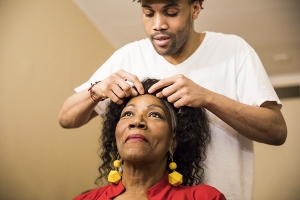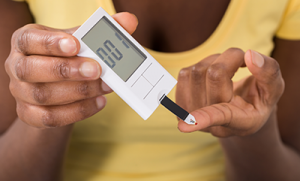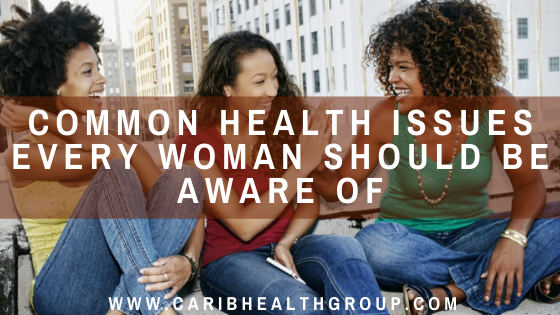Protecting and promoting the health of women is crucial to health and development, not only for the health of today’s citizens, but also for the health of future generations – Dr Margaret Chan, Director General, WHO.
Women and men are simply not the same, especially when it comes to health risks. The truth is, your biological structure impacts your predisposition to certain health concerns.
[irp]
1. Cancer
 Cancer, the second most dangerous threat to a woman’s health. It accounts for 22 percent of women’s deaths and kills nearly 350,000 women every year in the world. The most deadly in this category is breast cancer, which is the most common cancer among women, excluding skin cancer. It rarely affects men and is the leading cause of cancer death among women aged 40 to 55. Luckily, lifestyle choices help prevent at least one-third of all cancers, so you can reduce your risk by adopting healthier habits.
Cancer, the second most dangerous threat to a woman’s health. It accounts for 22 percent of women’s deaths and kills nearly 350,000 women every year in the world. The most deadly in this category is breast cancer, which is the most common cancer among women, excluding skin cancer. It rarely affects men and is the leading cause of cancer death among women aged 40 to 55. Luckily, lifestyle choices help prevent at least one-third of all cancers, so you can reduce your risk by adopting healthier habits.
2. Stroke

It’s commonly thought of as a problem primarily affecting older men, but stroke is a woman’s disease. Nearly 55,000 more women each year have strokes and about 60 percent of the total number of stroke deaths happen in women. Not only is it responsible for nearly 8 percent of all female deaths, it is also the leading cause of long-term disability in the world. The good news is that stroke can often be prevented. Immediately if you have signs of numbness or weakness in your face, arm, or leg— particularly if it’s only on one side of your body; sudden confusion; slurred speech or mixing up words; blurred vision; dizziness or loss of balance; or an unexplained severe headache, call 911. It’s better to have a false alarm than to delay any treatment.
3. Diabetes
 Diabetes, while definitely not just for women, raises women’s risk of heart disease 4 fold and is responsible for about 3 percent of all female deaths in the world. A serious issue in women’s health and a disease that affects nearly 30 million people in the world but almost one-quarter have not yet been diagnosed. Women are also more vulnerable to complications associated with diabetes, such as blindness, renal disease and depression. It’s preventable. Make sure to maintain a healthy lifestyle and a healthy weight, exercise, and regularly check your fasting blood sugar levels to allow early diagnosis.
Diabetes, while definitely not just for women, raises women’s risk of heart disease 4 fold and is responsible for about 3 percent of all female deaths in the world. A serious issue in women’s health and a disease that affects nearly 30 million people in the world but almost one-quarter have not yet been diagnosed. Women are also more vulnerable to complications associated with diabetes, such as blindness, renal disease and depression. It’s preventable. Make sure to maintain a healthy lifestyle and a healthy weight, exercise, and regularly check your fasting blood sugar levels to allow early diagnosis.
4. Blood Poisoning
 Often known as Sepsis, blood poisoning is a risk to the health of women and is responsible for the deaths of 1.5 percent of all women in the world. ‘Pregnant women‘ or ‘new mums’ need closer attention for signs of a potentially life-threatening sepsis. It can potentially be very serious, as it can cause a rapid fall in blood pressure (septic shock), which can lead to multiple organ failure and if untreated, sepsis can be fatal. This life-threatening disease occurs when the blood becomes polluted with bacteria or other contaminants that are usually caused by lung, urinary tract, abdomen or pelvic infections. The disorder may start with spiking fevers, chills, fast breathing, a shift in mental status and rapid heart rate, and the person sometimes becomes very ill very quickly.
Often known as Sepsis, blood poisoning is a risk to the health of women and is responsible for the deaths of 1.5 percent of all women in the world. ‘Pregnant women‘ or ‘new mums’ need closer attention for signs of a potentially life-threatening sepsis. It can potentially be very serious, as it can cause a rapid fall in blood pressure (septic shock), which can lead to multiple organ failure and if untreated, sepsis can be fatal. This life-threatening disease occurs when the blood becomes polluted with bacteria or other contaminants that are usually caused by lung, urinary tract, abdomen or pelvic infections. The disorder may start with spiking fevers, chills, fast breathing, a shift in mental status and rapid heart rate, and the person sometimes becomes very ill very quickly.
5. Kidney Disease
 Kidney infections affect women more than men. Frequent or untreated kidney infections can cause scarring on your kidneys and increase your risk of Chronic Kidney Disease (CKD). Early treatment can usually help prevent long term problems. To avoid getting kidney infections you should:
Kidney infections affect women more than men. Frequent or untreated kidney infections can cause scarring on your kidneys and increase your risk of Chronic Kidney Disease (CKD). Early treatment can usually help prevent long term problems. To avoid getting kidney infections you should:
• Drink plenty of fluids, especially plain water
• Go to the toilet as soon as you feel the need to, don’t hold it in
• Wipe from the front to the back after going to the toilet
• Go to the toilet after having sex
• Try to avoid getting constipated as constipation can increase your chance of developing a kidney infection
6. Alzheimer’s Disease
 A progressive, degenerative brain disorder, is responsible for about 5 percent of all female deaths in the world each year. More than half of the 4.5 million people living with this condition are women, and more women die from the disease than men. Although Alzheimer’s starts with simple forgetfulness and confusion, it can eventually lead to irreversible mental impairment. If you think you or someone else you know may have Alzheimer’s disease, be sure to get a complete medical work-up to rule out other causes of dementia.
A progressive, degenerative brain disorder, is responsible for about 5 percent of all female deaths in the world each year. More than half of the 4.5 million people living with this condition are women, and more women die from the disease than men. Although Alzheimer’s starts with simple forgetfulness and confusion, it can eventually lead to irreversible mental impairment. If you think you or someone else you know may have Alzheimer’s disease, be sure to get a complete medical work-up to rule out other causes of dementia.
7. Heart Disease
 Heart disease is the No. 1 killer disease in women especially Africans. Importantly, African women are less likely than Caucasian women to be aware that heart disease is the leading cause of death.towards staying healthy is knowing what you’re up against, and then taking the necessary steps to reduce your risk. The good news is that many of the leading menaces to women’s health are preventable, which may vary depending on a woman’s age and history.
Heart disease is the No. 1 killer disease in women especially Africans. Importantly, African women are less likely than Caucasian women to be aware that heart disease is the leading cause of death.towards staying healthy is knowing what you’re up against, and then taking the necessary steps to reduce your risk. The good news is that many of the leading menaces to women’s health are preventable, which may vary depending on a woman’s age and history.
Symptoms of a heart attack include pain in the chest, shortness of breath and body weakness. Women may also experience shortness of breath, fatigue, or diarrhea. People may not, however, perceive their symptoms as a heart attack, and dismiss them as being too hard-working or getting heartburn. And while menopause does not cause heart disease, other risk factors, such as higher blood pressure and cholesterol and lower estrogen, are more common after menopause.


